News of the Week
Page 28
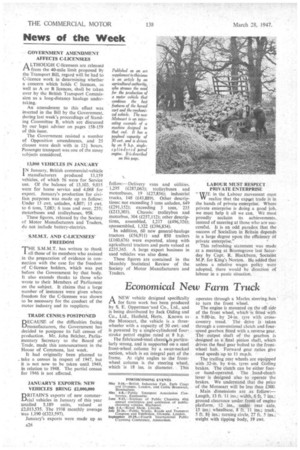
Page 29
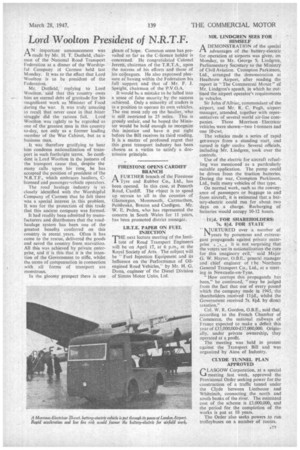
Page 30
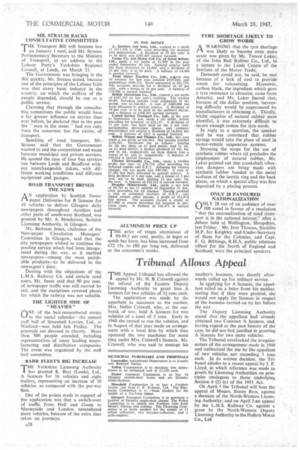
Page 31
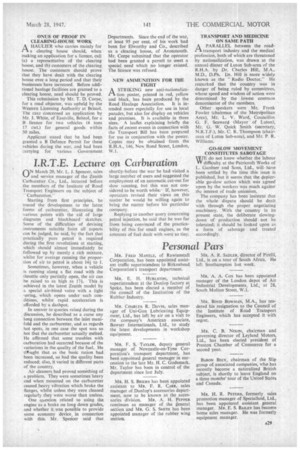
Page 32
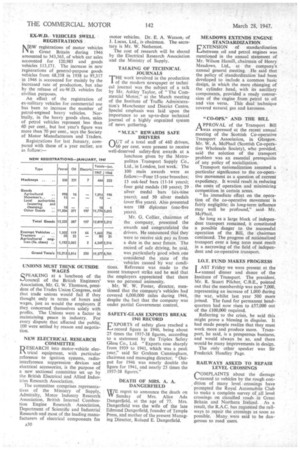
Page 33
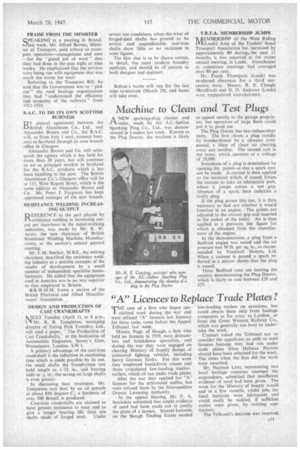
If you've noticed an error in this article please click here to report it so we can fix it.
GOVERNMENT AMENDMENT AFFECTS C-LICENSEES
A LTHOUGH C-licensees are released 1-1. from the 40-mile limit proposed by the Transport Bill, regard will be had to C-licence work in determining whether a concern which holds C licences, as well as A or B licences, shall be taken over by the British Transport Commission as a long-distance haulage undertaking.
An amendment to this effect was inserted in the Bill by the Government, during last week's proceedings of Standing Committee B, which are discussed by our legal adviser on pages 158-159 of this issue.
The Government resisted a number of Opposition amendments, and 25 clauses were dealt with in 12hours. Passenger transport was one of the many subjects considered.
13,000 VEHICLES IN JANUARY IN January, British commercial-vehicle 1 manufacturers produced 13,159 vehicles, of which 56 were for Service use, Of the balance of 13,103, 9,035 were for home service and 4,068 for export. January's production for civilian purposes was made up as follow: Under 15 cwt. unladen, 4,807; 15 cwt. to 6 tons, 7,083; 6 tons and over, 255; motorbuses and trolleybuses, 958.
These figures, released by the Society of Motor Manufacturers and Traders, do not include battery-electrics.
S.M.M.T. AND C-LICENSEES' FREEDOM
THE S.M.M.T. has written to thank all those of its members who assisted in the preparation of evidence in connection with the case for the freedom of C-licence holders, which was put before the Government by that body. It also extends thanks to those who wrote to their Members of Parliament on the subject. It claims that a large number of instances were given where freedom for the C-licensee was shown to be necessary for the conduct of the motor industry and its suppliers3
TRADE CENSUS POSTPONED
BECAUSE of the difficulties facing manufacturers, the Government has decided to postpone its full, census of production. Mr. John Belcher, Parliamentary Secretary to the Board of Trade, made this announcement in the House of Commons, last week.
It had originally been planned to take a census in respect of 1947, but it is not now to be taken until 1949, in relation to 1948. The partial census for 1946 is not affected.
JANUARY'S EXPORTS: NEW VEHICLES BRING 0,000,000
BRITAIN'S exports of new commercial vehicles in January of this year totalled 5,189 units, valued at £2,013,535. The 1938 monthly average was 1,190 (€323,597).
January's exports were made up as follow:—Delivery vans and utilities, ' 1,295 (£287,063); trolleybuses and motorbuses, 19 (£27,856); industrial trucks, 148 (£43,889). Other descriptions: not exceeding 3 tons unladen, 649 (£291,152); exceeding 3 tons, 235 (£213,303). Chassis: trolleybus and motorbus, 104 (€257,112); other descriptions, assembled, 1,217 (€496,326); unassembled, 1,322 (£396,834).
In addition, 60 new general-haulage tractors (£56,911) and 850 trailers (£160,676) were exported, along with agricultural tractors and parts valued at £235,365. A large export business in used vehicles was also done.
These figures are contained in the Monthly Statistical Review of the Society of Motor Manufacturers and Traders. LABOUR MUST RESPECT PRIVATE ENTERPRISE
" WE in the Labour movement mot realize that the expgirt trade is in the hands of private enterprise. Where private enterprise is doing a good job, we must help it all we can. We must proudly acclaim its achievements. instead of sneering at those who are successful. It is an odd paradox that the success of Socialism in Britain depends in a large degree upon the efficiency of private enterprise."
This refreshing statement was made at a meeting at Bromsgrove last Saturday by Capt. R. Blackburn, Socialist M.P. for King's Norton. He added that unless a relative wages policy were adopted, there would be direction of labour in a panic situation. FIRESTONE OPENS CARDIFF BRANCH
A FURTHER branch of the Firestone P1 Tyre and Rubber Co., Ltd., has been opened. In this case, at Penarth Road, Cardiff. The object is to speed up service to all in the counties of Glamorgan, Monmouth, Carmarthen, Pembroke, Brecon and Cardigan. Mr. W. E. Peden, who has represented the concern in South Wales for 11 years, has been promoted district manager.
I.R.T.E. PAPER ON FUEL INJECTION
THE next lecture meeting of the Institute of Road Transport Engineers will be on April 17, at 6 p.m., at the Royal Society of Arts. The subject will be " Fuel Injection Equipment and its Influence on the Performance of Oilengined Road Vehicles,' by Mr. H. G. Dunn, engineer of the Diesel Division of Simms Motor Units, Ltd.
MR. LINDGREN SEES FOR MSELF
ADEMONSTRATION of the special advantages of the battery-electric for operation at airports was given,on Monday, to Mr. George S. Lindgren, Parliamentary Secretary to the Ministry of Civil Aviation. Crompton Parkinson, Ltd., arranged the demonstration at Heathrow Airport, after reading the report in The Commercial Motor" of Mr. Lindgren's speech, in which he outlined the airport operator's requirements in vehicles.
Sir John d'Albiac, commandant of the airport, arid Mr. R. C. Pugh, airport manager, attended, together with representatives of several world air-line com panies. Three Morrison Electricar vehicles were shown—two 1-tormers and one I0-cwt.
The vehicles made a series of rapid get-aways from a standing start, and turned in tight circles Several officials, including Mr. Lindgren, took over the controls.
Use of the electric for aircraft refuelling was mentioned as a particularty suitable application. The pump could be driven from the traction batteries. During the war, Crompton Parkinson, Ltd., built many vehicles of that type.
On normal work, such as the conveyance of passengers or baggage to and from aircraft, it is estimated that a battery-electric could run for about two days on a charge. Recharging of batteries would occupy 10-12 hours.
1 1 FOR SHAREHOLDERS: 7s. 131:1. FOR STATE " NTURTURED over a number of
NI years by poisonous and extravagant propaganda against private enterprise . e. . it is. not surprising that the voters see in nationalization the cure for this imaginary evil,said Major G. W. ilayter, 0.B.E., general manager and chief engineer of t he Northern Genera! Transport Co., Ltd., at a meeting in Newcastle-on-Tyne.
" flow corrupt this propaganda has been," he continued, "may be judged from the fact that out of every pound which the company made in 1945, the shareholders received 111d., whilst the Government received 7s. 80. by direct taxation."
Col. W. R. Gordon. 0.B.E., said that, .according to the French Chamber of Commerce, the national railways of France expected to make a deficit this year of 433,000,000-£.37,000,000. Originally, under private ownership, they operated at a profit.
The meeting was held in protest against the Transport Bill and was organized by Aims of Industry.
CLYDE 'TUNNEL PLAN APPROVED
GLASGOW Corporation, at a special meeting last week, approved the Provisional Order seeking power for the construction of a traffic tunnel under the Clyde between Linthouse and VvItitcinch, connecting .the north and south banks of the river. The estimated cost of the scheme is £3,000,000, and the period for the completion of the works is put at 10 years.
The Order also seeks powers to run trolleybuses on a number of routes. An'r MR. STRAUSS BACKS CONSULTATIVE COMMITTEES
THE Transport Bill will become law on January 1 next, said Mr. Strauss, Parliamentary Secretary to the Ministry of Transport, in an address to the Labour Party's Yorkshire Regional Council, at Leeds, on March 23.
The Government was bringing in the Bill quickly, Mr. Strauss stated, because one of the principles of the Labour faith was that every basic industry in the country, on which the welfare of the people depended, should be run as a public service.
Claiming that through the consultative committees the public would have a far greater influence on service than ever before, he declared that in the past the " man in the street" had not only been the consumer but the victim, of transport.
Speaking of road transport, Mr. Strauss said that the Government wanted to end the competition and waste between municipal and private services. He quoted the case of four bus services run between Leeds and Bradford without interchangeable tickets, with different working conditions and different equipment and garages.
ROAD TRANSPORT BRINGS THE NEWS
AN application by Scottish Newspaper Deliveries for B licences for 16 vehicles to deliver Glasgow daily newspapers throughout Ayrshire and other parts of south-west Scotland, was granted by Mr. A. Henderson, Scottish Licensing Authority, in Glasgow.
Mr. Bertram Innes, chairman of the Newspaper Circulation Managers' Committee in Glasgow, said that the city newspapers wished to continue the pooling service which had been inaugurated during the war, as it enabled newspapers—among the most perishable products—to be delivered to the newsagent's door.
Dealing with the objections of the L.M.S. Railway Co. and certain road users. Mr. Innes said that 90 per cent. of newspaper traffic was still carried by rail, and the exceptions covered places for which the railway was not suitable.
THE LIGHTER SIDE OF "HEAVIES"
ONE of the best-remembered events in the social calendar—the annual staff ball of Scammell Lorries, Ltd., at Watford—was held last Friday. The proceeds are devoted to charity. More than '500 people attended, including representatives of many leading manufacturing and distributive companies. The event was organized by the staff 'ball committee.
BARR FLEET'S BIG INCREASE
THE Yorkshire Licensing Authority has granted R. Barr (Leeds), Ltd., A licences for 36 vehicles and eight trailers, representing an increase of 10 vehicles, as compared with the pre-war fleet.
One of the points made in support of the application was that a switch-over of traffic from Hull and Goole to Merseyside and London necessitated more vehicles, because of the extra time taken on journeys. ALUMINIUM PRICE UP F. price of virgin aluminium of I 99-99.5 per cent, purity, in ingot or notch bar form, has been increased from £72 15s. to £80 per long ton, delivered at the consumer's works. TYRE SHORTAGE LIKELY TO GROW WORSE
AWARNING that the tyre shortage was likely to become even more acute was given by M. Trevor Laker, of the John Bull Rubber Co., Ltd., in a lecture to the Leeds Centre of the Institute of the Motor Trade.
Demands could not, he said, be met because of a lack of coal to provide steam for vulcanizing. Moreover, carbon black, the ingredient which gave a tyre resistance to abrasion, came from America, and Mr. Laker feared that, because. of the dollar position, increasing difficulty would be experienced by manufacturers in obtaining it. Thirdly, whilst supplies of natural rubber were plentiful, it was extremely difficult to secure enough cotton for tyre cords.
In reply to a question, the speaker said he was convinced that rubber springs would take the place of steel in motor-vehicle suspension systems.
Stressing the scope for the use of synthetic rubber where oil precludes the employment of natural rubber, Mr. Laker pointed out that crankshaft vibration dampers are being made with synthetic rubber bonded to the metal surfaces of the inertia ring and the back plates, on which a special alloy was first deposited by a plating process.
ONLY 28 FAVOURED NATIONALIZATION
ONLY 28 out of an audience of over 300 voted in favour of a resolution "that the nationalization of road transport is in the national interest," after a debate held at Wellington, Shropshire, last Friday. Mr. Ivor Thomas, Socialist M.P. for Keighley andsUnder-Secretary of State for the Colonies, and Capt. F. G. Bibbings, R.H.A. public relations officer for the North of England and Scotland, were the principal speakers.
ONUS OF PROOF IN CLEARING-HOUSE WORK
AHAULIER who carries mainly for a clearing house should, when making an application for a licence, call (a) a representative of the clearing house, and (b) customers of the clearing house. The customers should prove that they have dealt with the clearing house over a long period and that their businesses have increased. Before additional haulage facilities are granted to a clearing house, need should be proved.
This submission by Mr. T. D. Come; for a road objector, was upheld by the Western Licensing Authority at Bristol. The case concerned an application by Mr. 1. White, of Eastville, Bristol, for a B licence for two vehicles (4 tons 17 cwt.) for general goods within 50 miles.
Applicant stated that he had been granted a B Defence Permit for these vehicles during • the war, and had been carrying for various Government Departments. Since the end of the war, at least 95 per cent, of his work had been for Elworthy and Co., described as a clearing house, of Avonmouth. Mr. Corpe submitted that the operator had been granted a permit to meet a special need which no longer existed. The licence was refused.
NEW AMMUNITION FOR THE FIGHT
A STRIKING new anti-nationalization poster, printed in red, yellow and black, has been produced by the Road Haulage Association. It is intended more especially for use in local parades, but also for display on vehicles and premises. It is available in three sizes. A leaflet explaining briefly the facts of .recent events in connection with the Transport Bill has been prepared for use in conjunction with the poster. Copies may be obtained from the R.H.A., 146, New Bond Street, London, W.1.
TRANSPORT AND MEDICINE ON SAME PATH
APARALLEL between the roadtransport industry and the medical profession, both of which are threatened by nationalization, was drawn at the annual dinner of Luton Sub-area of the R.H.A. by Dr. Charles Hill, M.A., M.D., D.Ph. Dr. Hill is more widely known as the " Radio Doctor." He remarked that the country was in danger of being ruled by committees, whose speed and wisdom of action were determined by the lowest common denominator of the members.
Other speakers were Mr. Frank Fowler (chairman of the Metropolitan Area), Mr. L. V. Ward, Councillot G. F. Seaward (Mayor of Luton), Mr. G. W. Quick Smith (secretary, N.R.T.F.), Mr. C. R. Thompson (chairman of Luton Sub-area), and Mr. P. R. Williams.
GO-SLOW MOVEMENT CONSTITUTES SABOTAGE \WE do not know whether the labour VV difficulty at the Patricroft Works of L. Gardner and Sons, Ltd., Will have been settled by the time this issue is published, but it seems that the deplorable go-slow action which was agreed upon by the workers was much against the interest of trade unionism.
The company has been insistent that the whole dispute should be dealt with through the proper negotiating machinery. With the country in its present state, the deliberate slowingdown of production should not be tolerated; it should be looked upon as
a form of sabotage and treated
accordingly. EX-W.D.• VEHICLES SWELL . REGISTRATIONS
N' registrations of motor vehicles in Great Britain during 1946 amounted to 343,365, of which car sales accounted for 120,985 and goods vehicles 113,171. The increase in new registrations of general-purpose goods vehicles from 68,358 in 1938 to 95,317 in 1946 is accounted for mainly by the increased rate of production, but also by the release of ex-W.D. vehicles for civilian purposes.
An effect of the registration of ex-military vehicles for commercial use has been to increase the number of petrol-engined heavy vehicles. Nor 11y, in the heavy goods class, sales of petrol vehicles represent less than 60 per cent., but last year's figure was more than 70 per cent., says the Society of Motor Manufacturers and Traders.
Registrations for last January, compared with those of a year earlier, are as follow:—
UNIONS MUST THINK OUTSIDE WAGES
SPEAKING at a luncheon of the council of the British Engineers' Association, Mr. G. W. Thomson, president of the Trades Union Congress, said that trade unions would fail if they thought only in terms of hours and wages, just as would the employers if they concerned themselves solely with profits. The Unions were a factor in maintaining, peace in industry. For every dispute that affected the public, 100 were settled by reason and negotiation.
NEW ELECTRICAL RESEARCH COMMITTEE
RESEARCH into motor-vehicle electrical equipment, with particular reference to ignition systems, radiointerference suppression devices and electrical accessories, is the purpose of a new sectional committee set up by the British Electrical and Allied Industries Research Association.
The committee comprises representatives of the Ministry of Supply, Admiralty, Motor Industry Research Association, British Internal Combustion Engine Research Association, Department of Scientific and Industrial Research and most of the leading manufacturers of electrical components felt motor vehicles. Dr. E. A. Watson, of J. Lucas, Ltd., is chairman. The secretary is Mr. W. Nethercot.
The cost of research will be shared by the Electrical Research Association and the Ministry of Supply.
TALKING OF TECHNICAL JOURNALS
THE work involved in the production of the modern newspaper or techni cal journal was the subject of a talk by Mr. Ashley Taylor, of "The Commercial Motor," at the March meeting of the Institute of Traffic Administration's Manchester and District Centre.. Special emphasis was laid upon the importance to an up-to-date technical journal of a highly organized system of news gathering.
"M.T.S." REWARDS SAFE DRIVERS
nUT of a total staff of 460 drivers,
60 per cent, were present to receive well-deserved safety-first awards at a luncheon given by the Metropolitan Transport Supply Co., Ltd., in London, last week. The 100 main awards were as follow:—Four 15-year brooches; 13 oak-leaf bars (11-14 years); four gold medals (10 years); 29 silver medal bars (six-nine years); and 50 silver medals (over Vire years). Also presented were 188 diplomas (one-five years).
Mr. G. Collier, chairman of the company, presented the awards and congratulated the drivers. He announced that they were to receive sick pay as from a date in the near future. The record of safe driving, he said, was particularly good when one considered the state of the vehicles caused by war conditions. Reference was made to the recent transport strike and he said that the employers appreciated that there was no personal animosity.
Mr. W. W. Foster, director, mentioned that the company's vehicles bad covered 6,000,000 miles during 1946, despite the fact that the company was under partial Government control.
1946 253
196 — 1 756 24 2,516 8,761
SAFETY-GLASS EXPORTS BREAK 1941 RECORD
EXPORTS of safety glass reached a record figure in 1946, being about 25 times the 1937-38 figures, according to a statement by the Triplex Safety Glass Co., Ltd. "Exports rose sharply from 1939 to 1941, which was a peak year," said Sir Graham Cunningham, chairman and managing director. " Output for 1946 was nearly double the figure for 1941, and nearly 25 times the 1937-38 figures."
• DEATH OF MRS. A. A. DANGERFIELD WE regret to announce the death on IN Sunday of Mrs. Alice Ada Dangerfield, at the age of 77. Mrs. Dangerfield was the wife of the late Edmund Dangerfield, founder of Temple Press, and mother of the present Managing Director, Roland E. Dangerfield. MEADOWS EXTENDS ENGINE STANDARDIZATION
EXTENSION of standardization between oil and petrol engines was mentioned in the annual statement of Mr. Wilson Hamill, chairman of Henry Meadows, Ltd„ at the company's annual general meeting. He said that the policy of standardization had been developed to include a common basic design, in which the mere changing of the cylinder head, with its ancillary components, provided a ready conversion of the engine from petrol to oil and vice versa. This dual technique covered natural gas and kerosene.
"CO-OPS." AND THE BILL
A PPROVAL of the Transport Bill .1"-lwas expressed at the recent annual meeting of the Scottish Co-operative Transport Association, in. Glasgow. Mr. W. A. McPhail (Scottish Co-operative Wholesale Society), who presided, said the solution of the transport problem was an essential prerequisite of any policy of socialization.
Transport nationalization assumed a particular significance to the co-operative movement as a question of current expediency. It would result in reducing the costs of operation and minimizing competition in certain areas.
"Its immediate effect on the operation of the co-operative movement is fairly negligible; its long-term influence may well be profound," said Mr. McPhail.
So long as a large block of independent transport remained, it constituted a possible danger to the successful operation of the Bill, the chairman continued. The progress of nationalized transport over a long term must result in a narrowing of the field of independent and co-operative transport.
I.O.T. FUND MAKES PROGRESS
LAST Friday we were present at the annual dinner and dance of the Institute of Transport. The president, Mr. R. Stuart Pitcher, C.B.E., pointed out that the membership was now 7,000, representing an increase of 1,000 during the war, whilst last year 500 more joined. The fund for permanent headquarters had now risen to £57,000 out of the £100,000 required.
Referring to the crisis, he said this might prove a blessing in disguise. It had made people realize that they must work more and. produce more. Transport, he said, is a prosperous business, and would always be so, and there would be many improvements in design.
The only other speaker was Sir Frederick Handley Page.
RAILWAYS ASKED TO REPAIR LEVEL CROSSINGS
COMPLAINTS about the damage 14–..caused to vehicles by the rough condition of many level crossings have prompted the Royal Automobile Club to make a complete survey of all level crossings on classified roads in Great Britain and Northern Ireland. As a result, the R.A.C. has requested the railways to repair the crossings as soon as possible. Many were said to be dangerous to road users.
PRAISE FROM THE MINISTER
SPEAKING at a meeting in Bristol, last week, Mr. Alfred Barnes, Minister of Transport, paid tribute to transport operators—management and men —for the 'grand job of work" that they had done in the past eight or nine weeks. He emphasized that the services were being run with equipment that was much the worse for wear.
Referring to the Transport Bill, he said that the Government was to pick out" the road haulage organizations that had undermined the efficiency and economy of the railways" from 1921-1939.
B.A.C. TO DO ITS OWN SCOTTISH BUSINESS
BY mutual agreement between the British Aluminium Co., Ltd., and Alexander Brown and Co., the B.A.C. will, as from July 1 next, transact business in Scotland through its own branch office in Glasgow.
Alexander Brown and Co. will relinquish the agency which it has held for more than 50 years, but will continue to act as principal stockist in Scotland for the B.A.C. products which it has been handling in the past. The British Aluminium Co.'s Glasgow office will be at 113, West Regent Street, which is the same address as Alexander Brown and Co. Mr. Peter J. Ferguson has been appointed manager of the new branch.
RESISTANCE WELDING INCREASING OUTPUT
D EFERENCE to the part played by .1N-resistance welding in increasing output per man-hour in the metal-working industries was made by Mr. R. W. Ayers, the new chairman of British Resistance Welding Machine Manufacturers, at the section's annual general meeting.
Mr. J. M. Sinclair, M.B.E., the retiring chairman, described the resistance welding industry as a notable example of the results of development by a small number of independent specialist manufacturers. He added that the equipment used in America was in no way superior to that employed in Britain.
B.R.W.M.M. forms a section of the British Electrical and Allied Manufacturers' Association. .
















































































